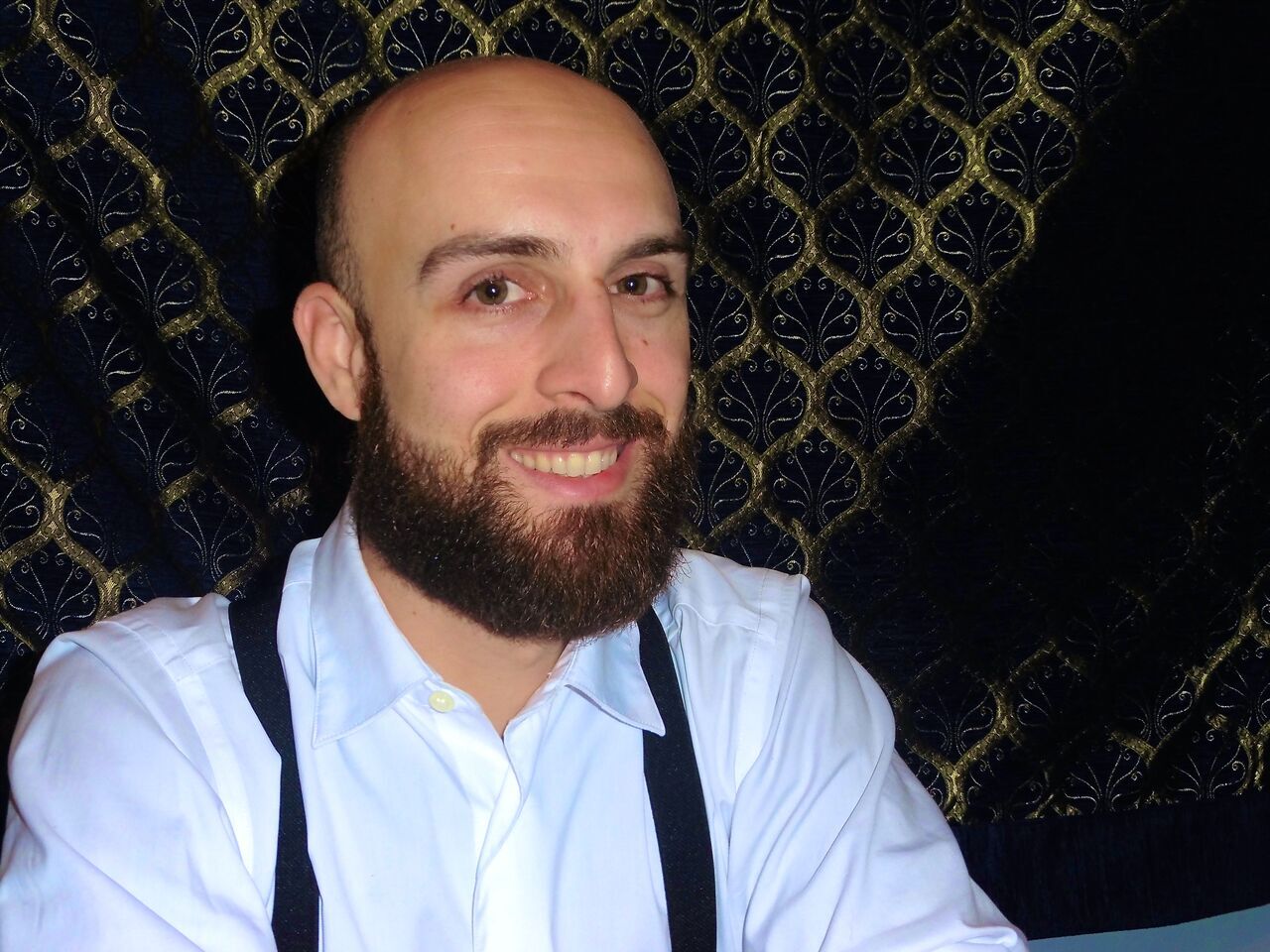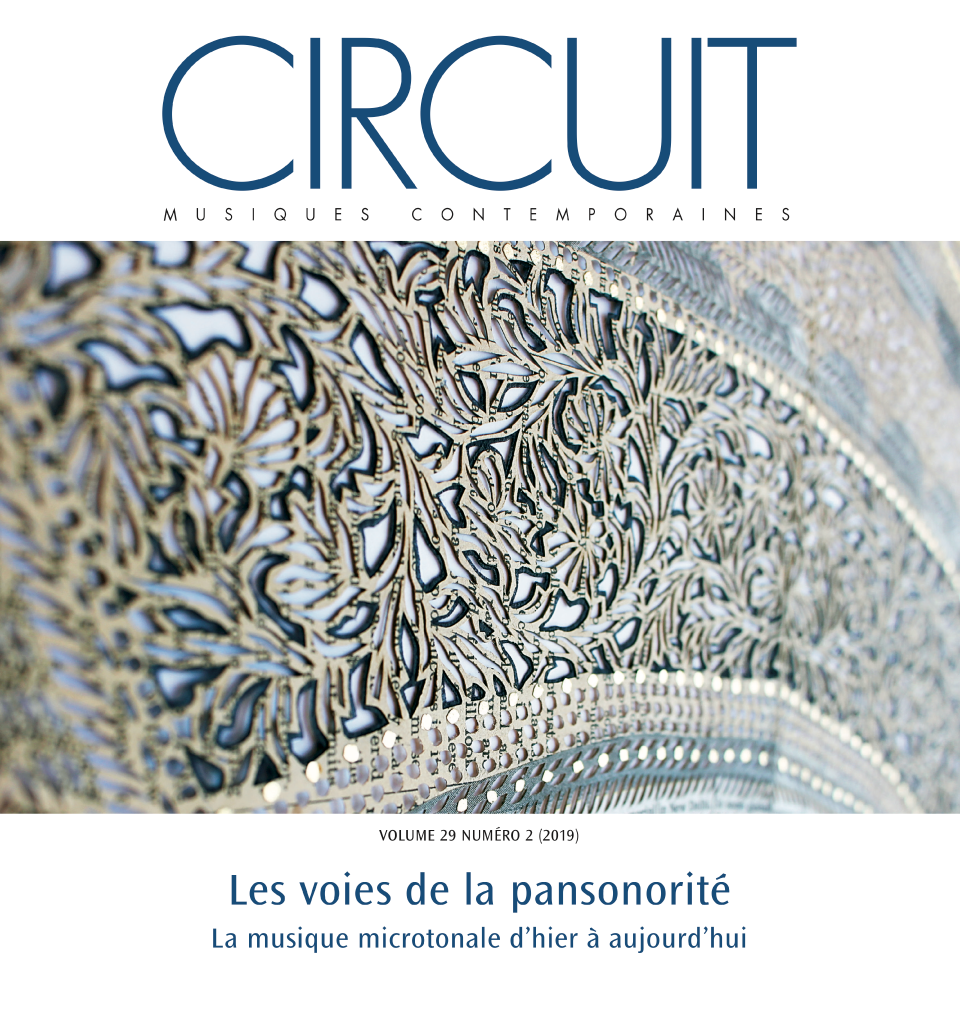Originally from Sherbrooke, QC, musicology student Paul Bazin is in the final year of his PhD. He will be presenting his research this Saturday October 26th as part of a day-long celebration of Canadian composers Bruce Mather and alcides lanza, marking their 80th and 90th birthdays. Find out more
The image above is a section of Bruce Mather's Régime 11, Type A, composed in 1978 for two pianos; one tuned a quarter-tone lower.
 What made you choose McGill for your studies?
What made you choose McGill for your studies?
When I completed my master’s at the Université de Montréal, I wanted to go elsewhere. I had no specific idea in mind. No projected advisor, no research topic. When the deadlines for inscriptions drew close, I put something together about composer Bruce Mather, met with Steven Huebner and Christoph Neidhöfer, and decided to apply. I only sent an application to McGill University, so I must have had a lucky star!
How has being a McGill student influenced you and your research?
It most certainly helped to improve my English quite a bit! Prof. Roe-Min Kok provided me with a great deal of encouragement in my first year, when I kept stumbling against language barriers when trying to voice my ideas. I also became fascinated by ancient music, especially medieval music, thanks to Julie Cumming’s paleography class. The mandatory year-long training in notational transcription and theory may be the best class I’ve attended in my whole time as a graduate student! Most of all, being a McGill student - though it most certainly isn’t unique to McGill - forced me to overcome the challenges of graduate school, mental health-related struggles, and to develop skills to cope with academic anxiety. Being better equipped to face these challenges - both on a human level and from a professional perspective – is something which I think will be useful for the rest of my life.
Explain your research in three sentences or less:
My research focuses on the microtonal music of Ivan Wyschnegradsky and its repercussions on the music of other composers. Bruce Mather (Canada) and Pascale Criton (France) are central figures in this exploration of creative forms of influence.
What led you to this particular topic?
During my undergraduate degree, I was a Research Assistant for the musicologist Jean Boivin, back in Sherbrooke, who’s one of the very few specialists of Québécois music. It is because of him that I chose to work on the music that is being written here! Back then, going through some old newspapers clips, I had come across an interview with composer Bruce Mather: he talked about an old Russian composer (Wyschnegradsky) he had met a few years prior to the interview, who had introduced him to the microtonal realm. Back then, I knew nothing about Mather’s music, but for some reason, the interview left quite an imprint in my memory. I therefore decided that I wanted Mather’s and Wyschnegradsky’s music, along with microtonality to be my PhD’s research topic! I managed to find Mather’s phone number, dared to give him a call and to explain my project - I remember my voice trembling a lot! With the manners of a true gentleman, and in his most concise way, Mather simply responded: “My dear, I’m at your disposal!” Fun thing: even though I am now a huge fan of microtonal music, I remember thinking, the very first time I heard someone talk about it: “What’s the point of composing music like this? It’s not even nice to the ear!”
How does your research add to what was already known?
Neither Wyschnegradsky, nor Mather or Criton, have enjoyed considerable scholarly attention, even though there’s been a considerable increase in interest towards the music of Wyschnegrasdky in the past few years. Prof. Brian Cherney has also done work worthy of mention in promoting the music of Mather, along with other Canadian composers, in the Canadian Music concerts he organises every year. The music of these composers is also little known.
On one hand, there’s a sort of Wyschnegradskian myth growing these days, which builds a very romantic aura around him. Even though it serves the recognition of his work, it also tends to occult important aspects of his career. I’m trying to deconstruct the romantic figure of the lonely, visionary artist who sacrificed his wealth and comfortable life situation - his grandfather was a Minister of Finance under a Tsar, and his father was the Head of the St. Petersburg International Bank before the 1917 Bolshevik coup. On the other hand, it’s sort of well-known to specialists that Wyschnegradsky was a huge influence on both Mather and Criton, but few have addressed the actual forms of such an influence in their works. This is what I’m trying do.
Were there any discoveries that you found particularly surprising?
Mather’s music is fascinating, very interior, and has such a craft of scoring! What instrumental colours one can find in his music! Criton’s music is also one of the very few sounds worlds I’ve had enormous pleasure discovering in the past few years. Textures, beatings, a sensation of timelessness, an understanding of things, also, which makes the discovery of the notions underlying her music a thrilling adventure in itself. Her Wander Steps is a good example:
Who is going to benefit most from your research?
I hope that this work will benefit the composers I’m writing on in the first place. I see my work as a modest contribution to their recognition. I hope performers might get interested in playing this music, learning its secrets, and bringing it to those who wish to discover new sonorities. Both Mather and Criton are living composers and have done exemplary work for the recognition of Wyschnegradsky’s œuvre. I think it is important that we also acknowledge their own creative contributions to our cultural world.
What is coming up next for you?
On October 26th, there’s a concert here at Schulich in celebration of Bruce Mather’s 80th birthday, and of alcides lanza’s 90th birthday. I’ll be presenting my work on the Mather/Wyschnegradsky relationship in the afternoon (learn more about the event). After the concert, the latest issue of journal Circuit, musiques contemporaines - a journal that I’ve been editorial secretary and administrative coordinator of for the past two years - will be released.

I’ve co-edited this special microtonal issue with Prof. Robert Hasegawa, who happens to be my co-adviser, and has been a solid rock during my academic journey. As well as our own papers, we’ve commissioned papers from others, including McGill Prof. Philippe Leroux and alumni Landon Morrison and Charles-Antoine Fréchette.
I’m looking forward to continuing working for Circuit after my graduation in Spring 2020, and to getting some rest before considering what the next step will be!

What advice would you give to new students in your program?
Don’t compete with your peers; instead, you should care for them. Throughout my years at Schulich, I found that I was much stronger when surrounded with friends whom I trusted and felt respected by. Share ideas, talk, go out for a beer (or a few beers).
Know the worth of the work you do, yet be humble and modest about it. Nobody wants to be surrounded by people who keep boasting about their numerous realizations…
If you get anxious about the future, get out there. Network outside of academia. In doing so, you might find work opportunities that’ll bring a bit of money in, which could well end up levelling down performance pressure you can feel if the academic path is the only one you know!
Mental health is vital. Talk to your peers, talk to your advisor. Get help if need be. Take time everyday to do something that’s not school related - it’s ok (and it’s good) not to reach your limits everyday!
Where is your favourite place to study?
I used to work a lot from home, in my “office”! I also used to go to the Collection nationale, at the BAnQ Grande Bibliothèque. For a year now, “Thèsez-vous?” has been the one place that I go to really get reading work done. To write my dissertation chapters, I lock myself away in monasteries! There, I can write several pages a day, and get some peaceful time listening to the monks singing during the liturgy of hours. I need silence to work, and to keep anxiety at bay…
What do you enjoy doing in your spare time?
Camelia Sinensis tea room is a fantastic place, even though I hardly manage to find enough free time to go downtown only to grab tea. My garden is also a heaven of peace during the Summer and Fall! 26 square meters of vegetables, squash, lettuce, tomatoes, melons, peas, beets, carrots, flowers; life! I water my garden, pluck weeds, care for every plant. At night I read novels, cook with my girlfriend and, lately, have been preparing our house towards the birth of our daughter!

What is your earliest musical memory?
My mother holding me while singing Dream a Little Dream of Me. I must have been two or three years old. Some chromatic melodic figures in this song still bring me back in time and provide me with an unexplainable sensation of colour!
If you hadn’t ended up in music, what would your alternate career path have been?
Good question. Likely a gardener! Or an author! I keep thinking that someday, I’ll write something else than academic papers. An epistolary fiction, perhaps…
What was the last book you read?
Hugo’s Notre-Dame de Paris. I have quite nerdy tastes when it comes to reading, and Hugo is surprisingly nice to read, once you get used to the language. I wish woman characters were pictured as stronger figures though…
If you were offered a return plane ticket to anywhere in the world, where would you go and why?
Corsica! I long to go back to Corsica, to trek across its mountains, 2000 meters high above the sea!

If you could invite any four notable figures from history (or alive today) to a dinner party, who would they be and why?
My great-grandfather, my grandparents (all four are still alive!) and my daughters! I wish they all had the chance to meet, as they’ve all been significant figures in my life and time unfortunately won’t allow for five generations to interact. We could listen to Machaut and Josquin des Prez in the background, they could ask me why I ventured into music (I would struggle to find a suitable answer…).
Paul Bazin's lecture "Bruce Mather: Disciple of Infinite Spaces" is at 1pm on Saturday 26 October 2019, in A-832, Elizabeth Wirth Music Building.
Read more about the rest of the day's events here.


